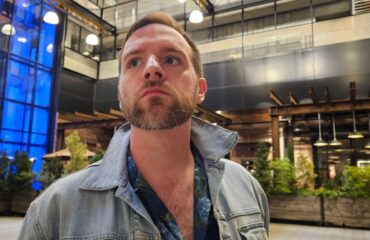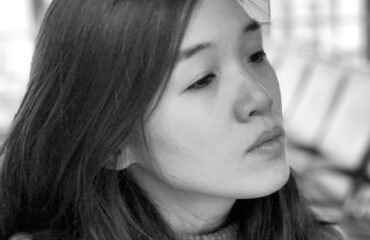INTERVIEW with Kyle Dargan
Kyle Dargan is the author of five collections of poetry: Anagnorisis (TriQuarterly/Northwestern UP, 2018). Honest Engine (University of Georgia Press, 2015), Logorrhea Dementia (University of Georgia Press, 2010), Bouquet of Hungers (University of Georgia Press, 2007) and The Listening (University of Georgia Press, 2003). He is the recipient of the Cave Canem Poetry Prize, and the Hurston/Wright Legacy Award. He lives in Washington, D.C., where he works, writes, and edits POST NO ILLS Magazine. Originally from Newark, New Jersey, Dargan is a graduate of Saint Benedict’s Prep, The University of Virginia, and Indiana University.
FWR: “Anagnorisis” is the moment in a tragedy where a character realizes his or her (or another’s) true nature. I was struck that your poems consider not only your realization of yourself, but also your realization of America, and what America thinks it knows about you. The first section of Cornelius Eady’s Brutal Imagination came to mind as a possible influence, but I wonder what other works you turned to in the shaping of this manuscript.
Along that thought, you’ve said that this is a work expressing “the freedom of speak”. Can we hope that America, the idea with the capital A, is listening?
KD: I appreciate your picking up on the multiple “recognition” moments throughout the text. I know the term anagnorisis leads one to look for one such moment, but the idea is at play in different parts of the book’s journey. If I can interpret text loosely enough to include more than books, I would definitely say Solange Knowles’ album SEAT AT THE TABLE (which was, interesting enough, inspired in part by Claudia Rankine’s CITIZEN). Whether or not America is listening doesn’t matter. I had to accept, as did Solange, that making art that clearly and unabashed depicts blk disdain and exhaustion –– and not as a function of either rage or woundedness –– will likely not be embraced by the popular critical and awards entities. (The lack of critical acknowledgement for A SEAT AT THE TABLE remains egregious to me.) But you have to do that sometimes to move the popular American consciousness towards being open to and able to process righteous, necessary and crisply articulated blk indignation. Or even just the belief that “white” America is not doing the best job at exorcising its own demons. This is not a book that was in my existing creative plan, and some days it really does feel like a “service” to me –– one that I am more likely to get tacitly maligned for by the artistic gatekeeping class.
FWR: In structuring the manuscript, how did you find balance between shorter and longer works? You’ve said that this wasn’t a ‘planned’ manuscript, like your other books had been. At what point did you realize what you had could, and needed, to stand on its own?
KD: Well, there was a point where I thought “In 2016, the African-American Poet Kyle Dargan Is Asked to Consider Writing More Like the African-American Poet Ross Gay” was the centerpiece of the manuscript (that was probably more of an emotional truth than a craft truth). So I knew that piece –– running about six pages –– needed space to function, somewhat as “Always a Rose” does in the center of Li-Young Lee’s ROSE. That aside, though, these poems are, on average, a lot longer than the poems in my previous four collections. I think that is related to my push towards a new depth of candor in my voice. There is a relentlessness to the opening section –– a weight –– that I wanted to be unavoidable, to go back to that idea of “training” readers’ consciousness. You have to deal with the first section just as I, and many other people of color, have had to live it over the past five years. I do let in more “air” as the book/journey progresses.
FWR: The “China Cycle” poems seemed to serve two purposes. The preceding poems were cast in a new light, as the speaker (and audience) consider the way both China and the United States are continually editing and creating the myths and history of each nation, while also establishing a new angle on the succeeding poems by bringing in more fully concerns of humanity’s impact on the natural world. When you wrote those poems, had you envisioned them as their own manuscript? If not, what was the act of joining them with the rest of poems like?
KD: There was a lot about my travels to China that, until recently, I was still processing. Even just the decision to write things that I would potentially publish, for as much as I am extremely appreciative of how I was hosted and treated as an American by the Chinese Writers Association (which is an arm of the ruling Communist party), I also was very aware of how the government was surveilling and detaining their own dissident writers and artists. To not say anything felt disrespectful to those silenced writers, and to speak candidly felt disrespectful to those who’d hosted me. But once I got over that, it was clear that China was the “bridge” for me and the book. It was both the place I escaped to in a psychically trying time as a blk American, and the place that showed me my American privilege and my inability to escape global colorism and its political ramifications. So what you stated about the “reconsidering” those poems encourage in the manuscript, that is exactly what I experienced in thinking about and having to explain my life in America to others as I traveled abroad.
FWR: Within the “China Cycle”, the idea of being ‘other’ takes on new meaning. While a poem like “A Progressive Mile” points with one hand to the act of being visibly a “dark/spectacle” in China, it also recalls the lines “I’m still trying to buy/ the same stitch of citizenship/ you take for granted” from “In 2016, The African-American Poet Kyle Dargan is Asked to Consider Writing More Like the African-American Poet Ross Gay” or “I think of race as something akin to climate change, / a force we don’t have to believe in for it to undo us” from “Daily Conscription”.
How do you see your poems speaking to the role of “the other” and the act of being made visible or invisible?
KD: So I honestly think that writing about feeling racially othered in a general way has reached the limits of its rhetorical usefulness. (And I may be totally off in thinking that.) There are many experiences of otherness from China I did not bother to attempt to render as poetry because, am I wrong, of course in 2018 the reality of a blk man in Tianjin China who speaks a little Mandarin is going to register as an oddity. What is more interesting to me at the moment is not what the “other” feels but what desires and anxieties fuel the actions of those doing the othering. That is what is happening at the end of “Progressive Mile.” It is quasi erotic, or maybe fetishistic the way in which he is staring at me. And only he really knows what’s up, so how do I get in there –– into his head? That is what I am examining now. I’d say that dynamic is true domestically as well.
FWR: Thinking of the performance of the body, I was struck by your use and manipulation of pop culture references, such as the opening epigram to “Dark Humor”, which quotes Richard Pryor, or “Avenger”, when you write:
Somewhere is the negro’s imagined America,
where we have Iron Man on our side,
though it does not matter if the hero is “black”
so long as the body inside is.
That poem, in particular, which contains Ferguson, Obama, and Tony Stark, struck me as an attempt to answer the multiple ways people of color are called upon to adjust to the expectations of whiteness, without the release that whiteness grants itself. Would you be able to speak further to this?
KD: Well, it is really an imagined Eric Holder cast as a Tony Stark figure, but yes. I think the sentiment you mention is present in that poem, but I think it is more –– or more interestingly to me –– present in “Poem Resisting Arrest.” I remember when I showed the book to a mentor, one not raised in America, he did not understand the poem because he could not identify the resistance, but that is the point. That blk people bend themselves backwards often to avoid abuse by the police, wind up abused or even dead, and are then further abused or criticized for asking why they have suffered this fate. (“Why” is one of the most dangerous questions a blk person can ask an officer.) But I think that goes back to Iron Man and the “negro’s imagined America.” Even there, the police, the State, is too corrupt to be imagined as a benevolent force so it has to be a superhero that fulfills the duty the State should fulfill –– i.e. protecting the innocent.
FWR: I know you teach writing across several genres. How does that influence your own writing?
KD: I think of myself as a learned unlearner, which puts me in a weird position as a teacher in the creative writing classroom. I think my way into craft through martial arts because I appreciate the clarity of high stakes arts (i.e. in some instances you live or you die depending on your craft decisions). That is, I believe, actually freeing because if your main goal is to fight to live, your cannot be stiffly, strictly beholden to styles and forms. It is the ability to transition between forms as needed which lead to success. Because, as they say in NARUTO, every jutsu (technique) has a weakness. So I teach, as Bruce Lee suggests, not knowledge of form but lived performance of fluidity. And I think that is something that one models more than one teaches to others. Thus I need to be continually striving for that –– and getting freer in my necessary formal transitions –– in my own work. One of my former students wrote me to say that reading ANAGNORISIS was like taking an intensive on lineation / line breaks. While flattered, what I really hope they see are the ways I am trying (and failing and trying) to achieve more effective fluidity when it comes to form.
FWR: Is there a poet (or poems) you love to teach or share?
KD: I’d say, to the above idea of moving as freely or as purely as the poem needs, pieces like Lucille Clifton’s “Won’t You Celebrate with Me” or Larry Levis’ “Picking Grapes in an Abandoned Vineyard” or Etheridge Knight’s “Belly Song.” There is really little for me to even teach with those works. You just need to internalize them and allow them to inform your own instinct.
FWR: (this is purely a NJ question, as someone else from that great, maligned place that I’ll never live in): Can we call Walt Whitman a New Jersey poet, as we’ve named a rest stop in his honor?
KD: I don’t think any one place can comfortably or wholly claim Mr. Multitudes. (The bridge even is operated by the Delaware River Port Authority––a Delaware/Jersey collaboration. And Jersey’s turnpike is one of its most hated aspects, so I don’t know how much of an honor the rest stop is.) Maybe Brooklyn can. And D.C. I’d rather New Jersey reconcile its relationship to Amiri Baraka than make space for Whitman. I think that is the problem, poetically with Jersey––and why so many of us don’t or cannot go back: it is often looking elsewhere for the genius when it is already right there going ignored in its own garden.


